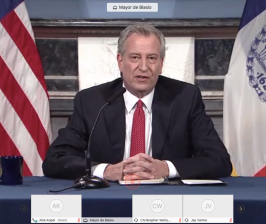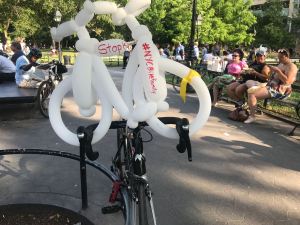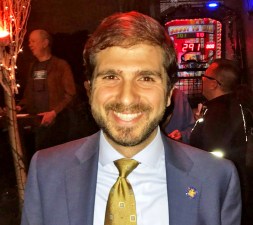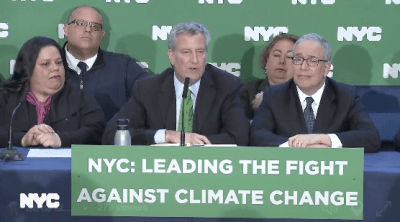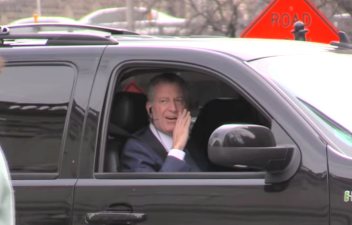Letter From L.A.: De Blasio is ‘Ignorant’ About Cali Drivers
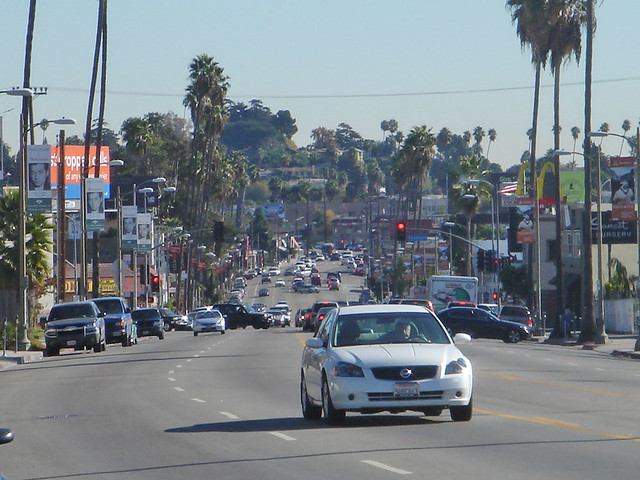
Journalist Allen Salkin lived in New York early in his still-thriving career, working for the New York Post and the New York Times in the 1990s and 2000s. He moved to L.A. two years ago and says life is better. But when Mayor de Blasio doubled-down on his motivations for not creating more open space by saying L.A. drivers are more honorable than New York drivers, Salkin was moved to file this letter from the City of Angels.

The most dangerous risk I’ve ever taken was trying to cross a street in Los Angeles on foot.
I was running late for a meeting at a medical center on Sunset Boulevard in Los Feliz, and the closest crosswalk was at a traffic signal a four-minute walk to the east. Crossing legally would make me 10 minutes late.
Before I tell you how I almost died three times trying to cross what seemed like a very quiet stretch of the boulevard (and Tom Cruise figures into this story very slightly), let me note Mayor de Blasio’s misperception of what drivers are like “In California.”
“In California,” said the mayor of New York, referring to a massive and diverse state on the West Coast, “drivers stop at intersections even if there’s no light or stop sign. They stop when people are trying to cross the street even in the middle of the street, a lot of time. This is a very different culture.”
What de Blasio revealed himself to be when it comes to West Coast cities is akin to a New York visitor whose entire itinerary comprises the M&M Store in Times Square, the Empire State Building observation deck, and the Statue of Liberty souvenir stand.
“All they eat in New York are hot dogs and toffee peanuts!” such a visitor might conclude. (That said, boy do I miss dirty water dogs right now).
The mayor is ignorant. Maybe he gleaned his ideas about L.A. from a viewing of the Steve Martin film “L.A. Story,” where lunchtime diners are so chill that they don’t pause their salad mastications for an earthquake. In the film, a friendly freeway sign guides Martin’s character to finding romance. Maybe de Blasio and his security detail missed the opening scene of “L.A. Story” in which drivers at a four-way stop sign are all being so polite that they wave each other on — into a four-way collision.
I’d like to hold de Blasio’s meaty hand as we attempt to cross where I did that day I almost died. I had parked on a residential sidestreet. This is not the billboard-and-nightclub-strewn part of Sunset known to tourists. In New York terms, the Los Feliz area is sort of a hybrid of Park Slope and Williamsburg, full of cafes, magnet schools and woke folks trying to be kind.
I don’t make it a policy to cross illegally in L.A. With cars that zoom at every opportunity, legal rights on red, and traffic lights that are irregularly timed, it’s generally far too dangerous to hoof it across these wide streets. But I looked left and right and the coast seemed clear. Plus I knew that even crossing legally in the area isn’t safe. The nearest crosswalk hundreds of yards/meters to the west is at L. Ron Hubbard Way. Walk that direction and you risk being confronted by someone working at the Vatican of Scientology, a massive complex of space-blue structures where you will be offered a personality test in hopes of luring you into the faith followed by, yes, Tom Cruise. Told you.
The more mainstream crosswalk east at N. Vermont Avenue stretches over a patch of asphalt that has buckled like a roll of fat on a Board of Election commissioner’s neck. It’s a good thing that there is an urgent care facility nearby. I once twisted my ankle on the unmarked hump so badly rushing to cross legally that I fell writhing to the ground. But I dared not writhe long, because I was worried someone would made a right on red right over my prone ass.
The X-rays were negative. For the swelling, they prescribed me ibuprofen pills so large I needed a tall double-decaf iced oat-milk cappuccino to swallow each.
O.K. No cars were coming either direction. There were red lights at the intersections in the distance. I stepped out. “Vroom!” I heard. A white Lexus was approaching the stop sign next to me. The street came to a T at Sunset, so the car had to go left or right. But it was not signaling either. Nor was it coming to a complete stop. “Vroom,” I heard again.
I wonder if Bill de Blasio knows what a “California stop,” is. The defining feature of a California stop is that it is not a stop. It is a slight slowing at a stop sign or red light, a faint gesture at a hypothetical stop. About 90 percent of stops in Los Angeles are California stops.
Why? We are so tired of traffic that when we CAN go fast, we must. Rolling a stop, or flooring it along an empty stretch of Sunset Boulevard is akin to running to beat the closing doors on the F train. Even with the slightly improved notifications, you don’t know when you’ll next be able to move towards your destination. You grab that soon-to-evaporate chance and go!
Just before the Lexus gunned it into the path I was taking across the block, I was able to throw myself back to the curb and avoid becoming a pedestrian death statistic.
The next time I made it a third of the way across before I realized the left turn signal I couldn’t see from Vermont had channeled a corpusclescence of speeding cars into the artery of Sunset, headed across the opposite side of the street. I’d be hung out in the middle of the street. I tried running back from where I’d come but another car had made a California stop and nearly turned right into me.
On the list of hazards that drivers in L.A. are looking out for, pedestrians fall behind wind-blown In and Out Burger wrappers, speed bumps, even-crazier drivers in new Maseratis, broken Topo Chico bottles in the gutter and other cars stopping suddenly because they see a taco truck they need to pull over for.
The third try did leave me stranded in the middle of the street when a car ran a red light at Vermont and left me catching my breath, two steps from my skull being crushed under a tire. I dashed back again, and finally took the hit and walked to the legal crosswalk.
By the way, catty corner to the urgent care facility on this intersection is an L.A. Metro train station. Theoretically, you can hop on this train and be whisked quickly downtown. There is no parking for this station.
When I lived in New York for two decades, I was an avid subway rider and rabid Citi Bike user, with unlimited passes for each. I evangelized about bikeshare, the single best value in New York City aside from people-watching at the Port Authority.
In two years in Los Angeles, I have never taken the train. I have one friend who said he once tried. “It was cool,” he reported to a group of us disembarking a Lyft at Dodger Stadium.
The reason I parked where I did in a residential neighborhood is because the parking at the Kaiser Medical Center is about $5 an hour or portion of an hour. My 90-minute meeting would run me $10. I could risk it and park for free in the big lot near the Fatburger drive-thru close to the hospital, but the signs warning non-customers of towing with a minimum $350 charge dissuaded me.
Now, I am projecting to a time after the quarantine and life goes back to normal. And I’m a Los Angeleno now, so when that happens, I will jubilantly climb into my lovely 2019 Subaru Forester with an entertainment system seamlessly integrated with my phone so I can pleasantly listen to podcasts, or place handsfree phone calls. I’ve really missed having anywhere to go in my car!
You see, right now we in L.A. aren’t begging our mayor for coronavirus road closures to benefit pedestrians. Sure, before all this there was excitement about a plan to turn the touristy part of Hollywood Boulevard into a pedestrian thoroughfare. But that was mostly because we want to keep tourists like the de Blasios wandering around on foot so we can extract as much money from them as possible before shoving them and their Mickey Mouse ear hats into Ubers bound for LAX.
It’s true, there’s not much point comparing New York to California when it comes to pedestrian needs. In Oakland, which has some densely packed areas, the city has successfully closed streets to car traffic to allow safe social distancing for walkers. But in other areas of the state, we don’t need what New York so obviously does: space to safely leave home to breathe fresh air.
I’m not saying all is Fantasyland out here right now, but we are already spread much farther apart. Our houses have outdoor space and our sidewalks are inherently less crowded. We don’t need what New York needs more than ever, space to walk.
Mayor de Blasio was correct about one thing. He said, “Obviously, we are much more densely populated and we have a very different driving culture.”
Indeed you do. New York drivers are far friendlier and more accustomed to pedestrians than California drivers. I direct the mayor to the 1982 song by Missing Persons, “Walking in LA.”
“Nobody walks in L.A.,” the Persons sing.
I’d much, much rather cross Fifth Avenue midblock at rush hour than Santa Monica Boulevard anywhere anytime. The cars in New York move slower and the drivers are attuned to walkers.
When I tried to cross Sunset, I was alone. I had no pedestrian comrades. Once when running to catch a downtown 6 at 23rd on a wet day, I slipped on the platform and my leg slid down between the train and the platform. Six arms reached out from riders and lifted me instantly up and into the train.
I love L.A., but I’d rather walk in NYC.
Allen Salkin, who writes for Vanity Fair and The New York Times, is the co-author (with Aaron Short) of The Method to the Madness: Untold Stories of Donald J Trump’s Road to the White House.
